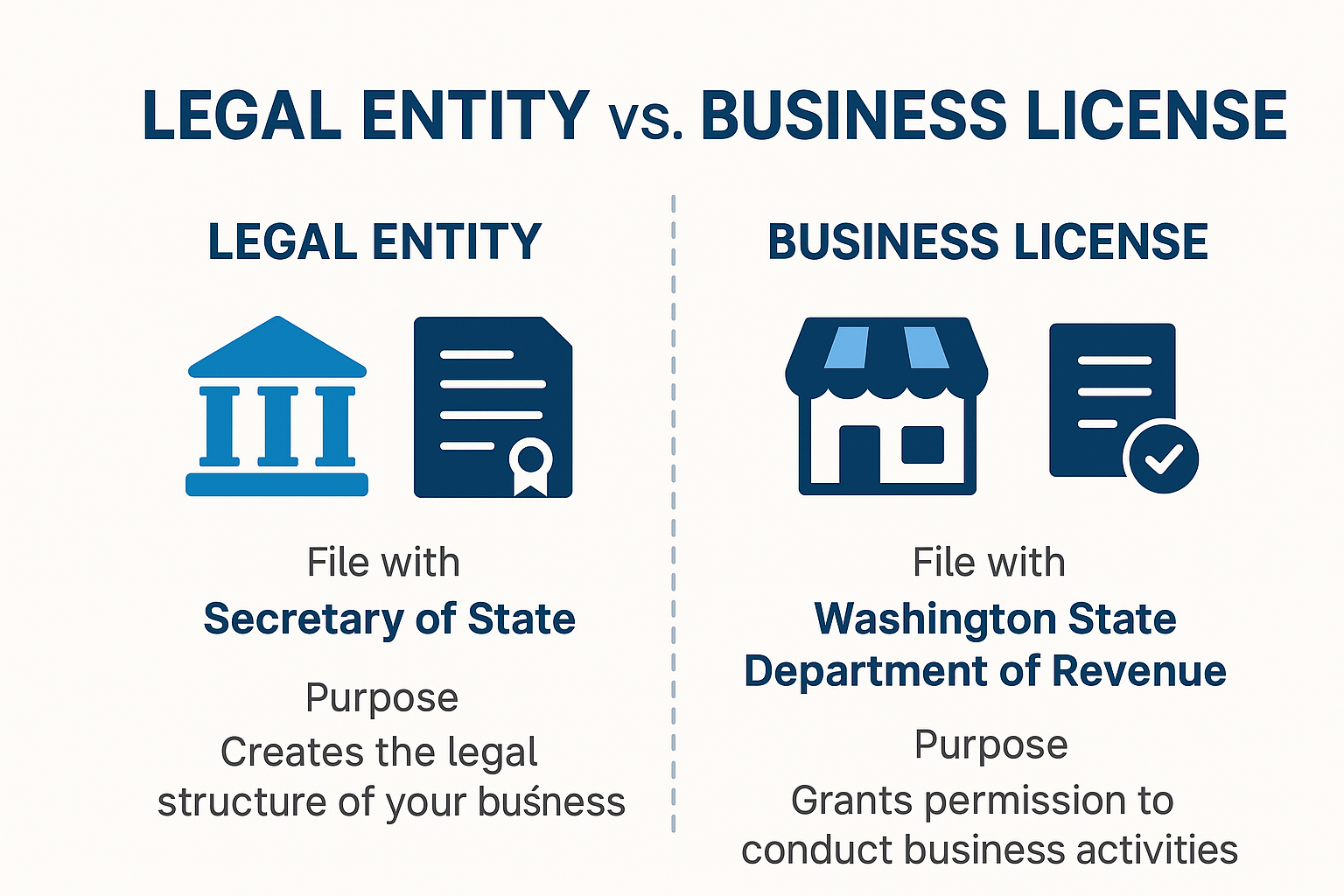
How to Choose Between a Sole Proprietorship and an LLC for Your Business
How to Choose Between a Sole Proprietorship and an LLC
Congratulations on starting your own business! Deciding how to structure your business is a critical step toward building a solid foundation for your venture. Two of the most common business structures are sole proprietorships and limited liability companies (LLCs). While both options have their benefits, your choice will depend on your specific goals, risks, and needs. Here’s a breakdown of the key factors to consider when deciding between these two structures:
Sole Proprietorship vs. LLC: Key Considerations
1. Ease of Setup
- Sole Proprietorship: This is the simplest business structure to establish. You don’t need to register a new "entity" with the state, and just need to get a simple $50 business license with the WA Department of Revenue. Technically, you don't even need to do that unless your income will exceed $12,000 per year. Then, you can start operating as soon as you begin your business activities. If you plan to use a business name other than your legal name, you may need to register a “doing business as” (DBA) name. Note that if you will be doing business in a city (i.e. City of Seattle), then you may need to get a City business license as well. Some city registrations are done alongside your WA DOR registration, and some cities you have to go to another site, such as File Local, to complete your city licensing. (Note: the CIty of Seattle's threshold for getting a business license is actually lower than Washington State. In Seattle, you must get a license if you do just $2,000 of business in a year.) Check Seattle licensing fees here.
- LLC: Forming an LLC requires more paperwork and costs. You must register your business with the state (e.g., through the Washington Secretary of State), file articles of organization, and potentially draft an operating agreement. There are also state filing fees and ongoing reporting requirements. For example, the online cost for starting an LLC in Washington is currently $200. Then, you also need to get your WA DOR and City licenses as well. Note: you also need to file an Annual Report ($70) with the WA SOS when you have an LLC.
2. Liability Protection
- Sole Proprietorship: You and your business are legally the same entity. This means you’re personally responsible for all debts, liabilities, and legal claims against your business. Your personal assets, like your home or savings, could be at risk.
- LLC: As the name suggests, an LLC provides limited liability protection. Your personal assets are generally shielded from business debts and legal claims, as long as you maintain proper separation between personal and business finances.
3. Taxation
- Sole Proprietorship: Profits are taxed as personal income, and you’ll report business earnings on your individual tax return. You’ll also be responsible for self-employment taxes (Social Security and Medicare).
- LLC: Similar to a sole proprietorship, an LLC’s profits are taxed as personal income for single-member LLCs. However, LLCs have the flexibility to elect taxation as an S Corporation or C Corporation, which may provide tax advantages in certain scenarios. Multi-member LLCs will need to divide profits and file taxes accordingly.
4. Costs
- Sole Proprietorship: This is the least expensive structure to maintain. There are minimal upfront costs, and ongoing expenses are limited to necessary licenses or permits.
- LLC: LLCs have higher setup and maintenance costs. You’ll need to pay state filing fees (which vary but can range from $50 to $500), annual or periodic report fees, and possibly additional costs for operating agreements or registered agents.
5. Business Credibility and Growth
- Sole Proprietorship: While this structure is ideal for small-scale or low-risk businesses, it may not provide the same level of credibility with lenders, investors, or larger clients. Financing is often limited to personal loans or funding.
- LLC: An LLC is seen as a more formal business structure, which can enhance your credibility with customers, lenders, and investors. It also allows for greater flexibility in raising capital by adding members or securing business loans.
6. Complexity of Operations
- Sole Proprietorship: Managing a sole proprietorship is straightforward, with minimal reporting and administrative requirements. However, the simplicity comes with increased personal risk.
- LLC: While offering liability protection and flexibility, an LLC requires more administrative work, such as maintaining separate business accounts, filing annual reports, and keeping detailed records.
Which Structure is Right for You?
Here are a few signs that might help you determine the best fit for your business:
Choose a Sole Proprietorship If:
- You’re testing a business idea or operating on a small scale.
- Your business involves low liability or minimal financial risk.
- You’re looking for a simple, low-cost way to start your business.
- You’re comfortable being personally responsible for debts and liabilities.
Choose an LLC If:
- You want to protect your personal assets from business liabilities.
- You expect your business to generate significant profits or grow quickly.
- You’re targeting larger clients or contracts that may require a formal business entity.
- You’re looking for flexibility in taxation options and long-term growth potential.
Additional Considerations
- Licensing and Compliance: Regardless of your choice, ensure you comply with local and state regulations. For example, in Washington, you may need to register your business with the Department of Revenue (DOR), obtain city-specific licenses, or secure an EIN from the IRS.
- Mixing Finances: Keep personal and business finances separate, especially if you choose an LLC. This is critical for maintaining liability protection.
- Insurance: Both sole proprietorships and LLCs can benefit from business insurance to protect against unforeseen risks.
Final Thoughts
Deciding between a sole proprietorship and an LLC is a significant decision that depends on your business’s nature, financial goals, and risk tolerance. While a sole proprietorship is simple and cost-effective, an LLC offers liability protection and flexibility that could benefit you as your business grows. Consulting with a legal or financial professional can help you make the best decision for your specific situation.
If you need help with registering your business, obtaining an EIN, or understanding compliance requirements in Washington, there are resources available, such as guidance on filing paperwork with the WA Secretary of State or help from business development specialists. Good luck as you embark on this exciting journey!








